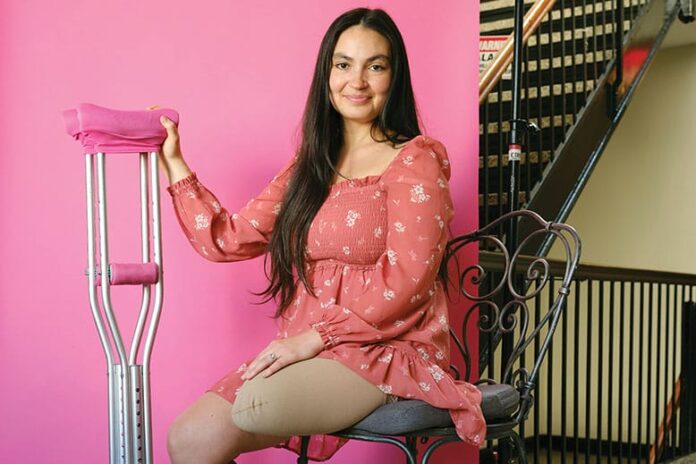When Lisa Fitzgerald fell onto the tracks at the Morristown NJ Transit station on May 4, 2024, and was struck by a commuter train, the chances of survival were almost nonexistent. In a matter of seconds, the Verona native’s life changed forever—her leg severed at the knee, her body broken, her future suddenly uncertain. Yet what followed has become one of New Jersey’s most inspiring stories of resilience, determination, and hope.
Now 31, Fitzgerald has become widely known as the “Miracle of Morristown,” a name that captures both the improbability of her survival and the remarkable spirit she has carried into every stage of recovery. Sitting in a café in her hometown, crutches at her side, she radiates the same positivity that first drew attention during her hospital stay. Her smile is bright, her voice steady, her sense of humor intact. What could have been the end of her story has instead become the start of an extraordinary new chapter.
The accident itself was harrowing. Fitzgerald had been visiting family in Morris County and was rushing to catch a train when she slipped and fell directly into the path of a 60-ton locomotive. The train struck her, instantly severing her leg. As the rest of the train barreled forward, she flattened herself against the platform wall, avoiding further injury by inches. Knowing another train was due, she willed herself to climb back onto the platform despite a broken foot, an act of grit and athleticism that likely saved her life.
Her background as a trained EMT may also have been a deciding factor. While bleeding heavily, she attempted to fashion a tourniquet from her flannel shirt. Though she couldn’t manage it, she used her hands to slow the bleeding until help arrived. Moments later, a police officer with a tourniquet—freshly trained in its use—reached her and stabilized the wound. From there, Fitzgerald was rushed to Morristown Medical Center, where doctors performed emergency surgery and later completed an above-the-knee amputation.
Even in the ambulance, Fitzgerald’s sense of humor surfaced. Between waves of agony, she joked about suddenly weighing less and her pedicures costing half as much. This mix of courage and levity quickly became her trademark. Nurses and doctors recall her lifting their spirits even as she endured excruciating pain, and her hospital room became a revolving door of family celebrations. On her 30th birthday, her siblings and friends threw a “glamputation” party, complete with decorations and laughter that echoed down the hallways.
The recovery that followed was far from simple. Fitzgerald expected to be fitted with a prosthetic within months, but setbacks stretched the timeline into years. A retired prosthetist, repeated fittings that failed, and insurance disputes all delayed progress. In the meantime, she adapted to crutches, even as the strain on her wrists and back added to the constant nerve and phantom pain she battles every day. Several additional surgeries lie ahead to correct complications and prepare her leg for a proper prosthetic.
Financial strain has compounded the physical struggle. Despite mounting medical bills and an inability to return to her job at her family’s financial services firm, her applications for disability benefits have been denied. The initial outpouring of donations through crowdfunding has slowed, and insurance companies have resisted covering advanced prosthetics that would allow her to return to sports like snowboarding, climbing, and surfing. The cutting-edge technology she needs could cost more than $100,000 and must be replaced every few years.
Yet Fitzgerald refuses to let frustration define her. She has returned to many of her favorite activities—yoga, Pilates, swimming, and even climbing gyms—adapting each to her new reality. Her sister Samantha became certified in amputee yoga, transforming therapy into shared family resilience. She also credits her accident with sparking positive changes in those around her, most notably her mother, who launched her own fitness journey after witnessing her daughter’s determination.
Her story has traveled far beyond New Jersey. She has been featured on national television and in magazines, yet she is most proud of the one-on-one conversations she has with young trauma survivors at Morristown Medical Center. This fall, she is scheduled to speak in Kansas City to a resilience organization, continuing to expand her role as a source of hope for others.
Fitzgerald acknowledges that the road is not without its dark days. Pain, sleepless nights, and financial uncertainty remain constant challenges. But she insists that her focus must always be forward. “A day spent upset is a day of progress wasted,” she says, echoing the mindset that has carried her this far. “You have to look for the good and keep on moving. I don’t want to look back.”
Her survival has become a symbol for many in New Jersey, not just of physical resilience but of the ability to reclaim joy after unimaginable trauma. As she continues to fight for the prosthetic that will allow her to snowboard again, babysit her niece and nephew with more ease, and walk without crutches, her journey remains a testament to perseverance.
In a state known for its strong communities, Fitzgerald’s story resonates as a reminder that hope, humor, and determination can help overcome even the steepest obstacles. Her nickname, the “Miracle of Morristown,” isn’t just about surviving a train accident—it’s about redefining life in its aftermath and showing others what it means to keep moving forward.
For more stories of resilience, health, and wellness across New Jersey, visit Explore New Jersey’s health and wellness section.












